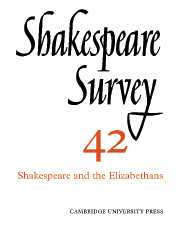Book contents
- Frontmatter
- ‘Jack hath not Jill’: Failed Courtship in Lyly and Shakespeare
- Truth and Art in History Plays
- Chronicles and Mythmaking in Shakespeare’s Joan of Arc
- King John and Embarrassing Women
- Golding’s Ovid, Shakespeare’s ‘Small Latin’, and the Real Object of Mockery in ‘Pyramus and Thisbe’
- Ovid and the Sonnets; or, did Shakespeare Feel the Anxiety of Influence?
- The Play of Sir Thomas More and Some Contemporary Events
- ‘Nobody’s Perfect’: Actors’ Memories and Shakespeare’s Plays of the 1590s
- The Boyhood of Shakespeare’s Heroines
- Shakespeare’s ‘Brawl Ridiculous’
- Shakespeare’s Handwriting
- Shakespeare Performances in England, 1987–8
- Professional Shakespeare Productions in the British Isles, January-December 1987
- The Year's Contributions to Shakespearian Study 1 Critical Studies
- 2 Shakespeare’s Life, Times, and Stage
- 3 Editions and Textual Studies
- Books Received
- Index
The Play of Sir Thomas More and Some Contemporary Events
Published online by Cambridge University Press: 28 March 2007
- Frontmatter
- ‘Jack hath not Jill’: Failed Courtship in Lyly and Shakespeare
- Truth and Art in History Plays
- Chronicles and Mythmaking in Shakespeare’s Joan of Arc
- King John and Embarrassing Women
- Golding’s Ovid, Shakespeare’s ‘Small Latin’, and the Real Object of Mockery in ‘Pyramus and Thisbe’
- Ovid and the Sonnets; or, did Shakespeare Feel the Anxiety of Influence?
- The Play of Sir Thomas More and Some Contemporary Events
- ‘Nobody’s Perfect’: Actors’ Memories and Shakespeare’s Plays of the 1590s
- The Boyhood of Shakespeare’s Heroines
- Shakespeare’s ‘Brawl Ridiculous’
- Shakespeare’s Handwriting
- Shakespeare Performances in England, 1987–8
- Professional Shakespeare Productions in the British Isles, January-December 1987
- The Year's Contributions to Shakespearian Study 1 Critical Studies
- 2 Shakespeare’s Life, Times, and Stage
- 3 Editions and Textual Studies
- Books Received
- Index
Summary
In previous discussions of the play of Sir Thomas More much has been said about the opening 'ill May Day' scenes and little about the play's third and final phase, Sir Thomas's fall. In this short paper I want to look at the play's ending and at some associated problems.
First, though, a question. What kind of play is it? Scott McMillin, in his important recent study, called it a history play, and, the history play being a 'hold-all' genre, perhaps rightly. I think, however, that a subgenre that became popular in the 1580s and 1590s provides a more useful label - the 'wise man play', which included Dr Faustus, Friar Bacon, John of Bordeaux, John a Kent and probably lost plays such as The Wise Man of Westchester. These plays celebrated the deeds of a non-aristocratic wise man who rises to be a friend of princes; he solves the prince's problems, plays tricks on others, and in some cases overcomes a rival wise man (Friar Bungay, John a Cumber; Sir Thomas More has a contest in courtesy with a rival scholar, Erasmus). Though Sir Thomas makes no use of magic, his play follows a recognizable model, which could end either as a tragedy, as does Dr Faustus, or with a hero still alive or even flourishing (Friar Bacon, John a Kent). I mention these alternatives because Munday and his fellow-dramatists could have ended the play with Sir Thomas as Lord Chancellor, loved and respected by all.
- Type
- Chapter
- Information
- Shakespeare Survey , pp. 77 - 84Publisher: Cambridge University PressPrint publication year: 1990
- 1
- Cited by

